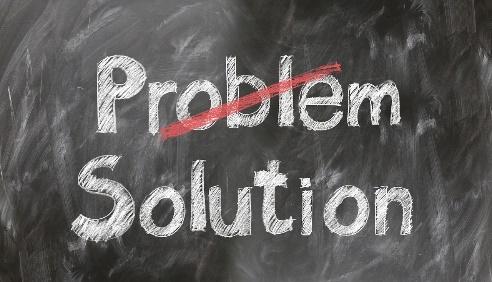Challenge Solved! 
An Advice Column for Contact Center Managers
February 2020
Every effective contact center is engaged in launching new initiatives. If you’re not evolving and growing with new strategies and tactics, there’s a good chance your business may falter. But the question is this: How can you maximize your new initiatives this year, especially given the incredible complexity of the contact center environment? In this month’s Challenge Solved, our featured expert, Dina Vance from Ulysses Learning, shares her unique perspective on this crucial topic. Dina is a widely-respected thought leader on developing and leading contact center customer service, sales, and coaching staff, and a pioneer in optimizing contact center performance through a focus on results, people, and process.
Have your question answered in an upcoming Challenge Solved advice column! Email your question to: ChallengeSolved@ulysseslearning.com
Q: As we kick off a new year, any tips to achieve better results from the major initiatives we’ve planned?
Our featured expert for this month’s question is:
Dina Vance, Senior Vice President, Managing Director of North American Operations

A: I recently participated in an escape room experience. I loved it because it puts into motion many of the consulting tips I give my clients who asked the same question you posed. You see, an escape room is very similar to running a contact center!
In an escape room game, you and a group of diverse people are given a series of hidden clues and challenging puzzles to solve so you can accomplish your mission to “escape” the room in an hour. Think about it, as contact center leaders, we’re tasked with major initiatives which need to be implemented swiftly. However, we may not have all the pieces to the puzzle upfront, we have to figure out how to work with people who possess a mix of styles and backgrounds, and exactly how we accomplish our end goal may not always be present at the onset. These conditions all exist in an escape room. With that, here are four escape room “lessons learned” to help optimize results from your major initiatives in 2020:
-
Teamwork. The social abilities your team members will build as they complete their mission (initiative) are widely recognized by most organizations as a “must have” for the company’s overall success, with abilities such as communication and organization skills topping the list. Teams that do best will use both these skills to break up into and work in smaller teams, enabling them to work on different puzzles (projects) concurrently. Delegation will also figure prominently and is integral to your team’s successful escape. Teams will need to figure out who does what best and distribute tasks accordingly. Tip: Often a missed opportunity in the contact center is to include the end user in a major initiative. Recently, I was visiting a contact center that just changed their desktop interface for frontline associates and “nothing was going right.” When asked about interface functionality, reps were quick to offer why this new platform wasn’t meeting their needs and, in fact, was increasing handle time and requiring more steps for even the simplest of tasks. When considering who should be part of the team, make sure you have the end user at the table.
-
Speed (with flexibility). There are numerous fast-moving parts in an escape room, just like your contact center. Plus, to complicate things, some puzzles lead to other puzzles and some stand on their own. Some require multiple people to solve, and some are easier with just one person. But above all else, your team needs to work on all these tasks FAST. Again, just like your contact center. Effective communication is the key to speed. If someone solves a puzzle alone but doesn’t tell anyone, it could use up precious time as the rest of the group tries to solve the next puzzle. If someone isn’t confident in their answer or doesn’t tell the group what they got, it can even lead to another person in the group solving the same puzzle on their own for a second time. Also, to achieve speed you need flexibility. This means some people will need to give up on their ideas for the group to benefit. For example, oftentimes, teams will not ask for outside support when they’re stuck because they are intimidated or feel like it will reflect poorly on their own abilities. They want to do it all on their own with no outside assistance. Tip: Give your team permission up front to throw up the flag and ask for help throughout your initiative.
-
Creativity. A third valuable takeaway from an escape room exercise is the ability to creatively solve problems. Some puzzles are fairly simple—you’ll be presented with a math or logic problem in which you need to fill in the blanks. Other puzzles are the complete opposite—you’ll be presented with a complex problem that may require you to look at everything around you for multiple angles (literally and figuratively). This is where having a team of diverse individuals can play to your favor—different people with different experiences can enhance your effectiveness. Tip: Sometimes quieter team members may take a backseat during a project. If you see this happening, ask your more introverted team members for their thoughts. Usually, they will offer a perspective the team hadn’t considered.
-
Patience. Escape room games, just like many new contact center initiatives, take an incredible degree of patience and concentration. There is no room (or time) for personal agendas or side-bar activities in a high-pressure situation like this. Instead, your team must have a single focused goal. And they need to be patient with one another in the process. Being respectful of differences and being kind to one another can be challenging when people may feel they’re in a pressure cooker. Tip: It’s appropriate to draw this possibility to your team’s attention before starting the initiative. Remind them to “pack your patience”.
And, remember your secret weapon!
Here’s one last point I want to share. After completing an initiative, you want to take the time to learn from it. Bring your people together and explore these questions:
-What did they personally enjoy most about the experience?
-What was their role in the process and what did they learn that they can take with them to the next project?
-What did they learn about their colleagues during the project? How can they tap into their colleagues’ special talents on future initiatives? (This helps reinforce the “there is no ‘I’ in team” concept, which is so important to building high-functioning contact centers.)
Your goal during the initiative debrief is to facilitate a respectful dialogue where team members learn more about their talents as perceived by others, build awareness of one another’s strengths, and express their appreciation for one another’s talents and differences. It’s a powerful takeaway that can reap rewards long after your “escape room” initiative is complete.
More on this month’s featured expert…
Dina Vance
Senior Vice President, Managing Director of North American Operations

In her current capacity with Ulysses Learning, Dina is responsible for the day-to-day operations of the company and also serves as the chief client relationship executive, working with Fortune 100 clients and other progressive organizations to redefine the way customers are cared for. Under her leadership, Ulysses has become well known for its work in transforming customer service, sales and coaching cultures through the development of emotional intelligence or “EQ” so that Judgment@WorkTM can be confidently, consistently and expertly applied on every call. The company has special expertise in serving the insurance, utilities and financial services industries.
Before joining Ulysses in 1999, Dina was responsible for the ground-level startup of two contact centers which led to her accepting a role as call center lead consultant and division manager for an international bank training organization.
Dina can be reached at dvance@ulysseslearning.com; for more details on Ulysses Learning visit www.ulysseslearning.com.
 Email us your toughest challenge today!
Email us your toughest challenge today!
Managers looking for answers to their toughest contact center challenges are encouraged to Email their challenges to: ChallengeSolved@ulysseslearning.com
NOTE: Your identity is protected; we will not publish your name or company name.
Challenge Solved! is sponsored by:
UlyssesLearning was founded in 1995 as a joint venture with Northwestern University’s Learning Sciences department and continues to bring clients new, innovative enhancements to its industry-leading training. Contact centers achieve profound business results, ahead of schedule, with Ulysses Learnings’ artful blend of patented simulation-based e-learning, facilitated exercises, coaching, and tools, that redefine the way customers are cared for and transform customer service, sales, and coaching cultures. Ulysses has the only training proven to build emotional intelligence or “EQ” so that Judgment@WorkTM can be confidently, consistently, and expertly applied on every call.
Ulysses Learning is a multi-year recipient of the Gold Stevie© Award for best contact center customer service training.
Begin your contact center transformation now. Phone 800-662-4066 or visit www.ulysseslearning.com to get started.